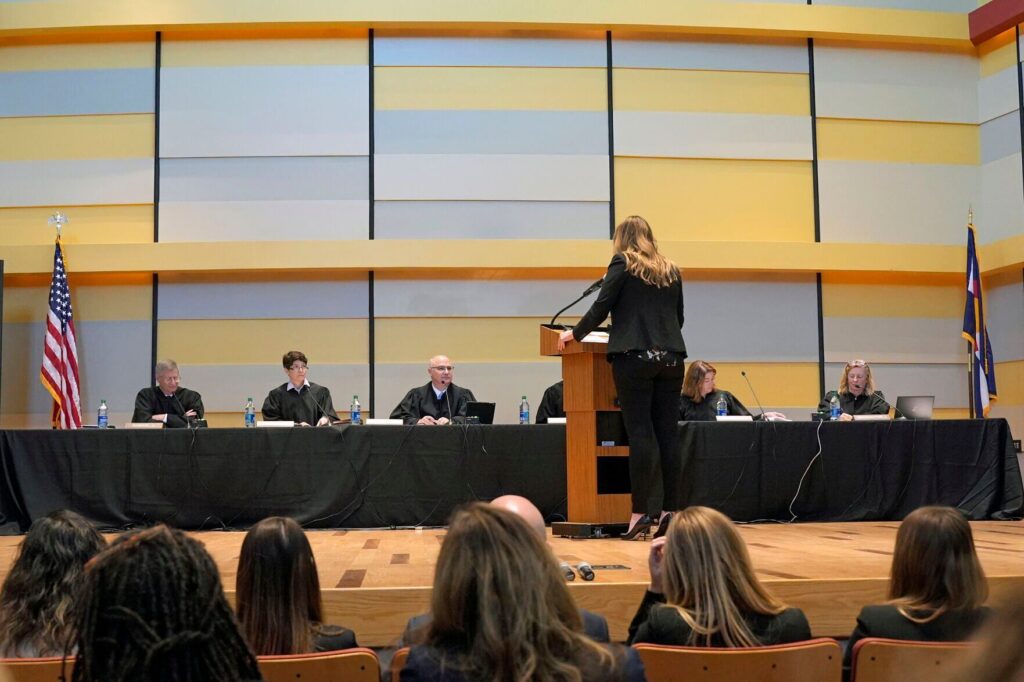Condo conundrum: Can Colorado lawmakers this year find a way to jumpstart affordable condo market?
It’s viewed as the “third rail” in affordable housing — the one path lawmakers have feared to tread.
Not this year.
A bill expected to be introduced this month takes a new approach to the challenges surrounding condominium construction, and its sponsors hope to avoid the battles between homebuilders and trial lawyers that have perennially erupted for years.
Trial lawyers have often argued that if companies just built better condos in the first place, there wouldn’t be so much litigation.
One bill, sponsored by Reps Shannon Bird, D-Westminster and Speaker Pro Tem Andrew Boesenecker, D-Fort Collins, focuses on building affordable condos — right the first time.
Notably, its list of 23 co-sponsors includes progressive and moderate Democrats, as well as Republicans of all stripes. In addition to Bird and Boesenecker, the bill secured sponsorship from Senate President James Coleman, D-Denver, and Sen. Dylan Roberts, D-Frisco.
Gov. Jared Polis is also believed to support changes to the “construction defects” law, based on his comments during his January State of the State address, which was the first time the governor really delved into the condo issue in his annual speech before the legislature. At a roundtable with business leaders hosted by the Colorado Business Roundtable, Polis said he wants to “reform the construction defects” law “so that condos can be built.”
“(They’re) great starter homes,” he said, noting they help owners build equity toward a single-family home later.
“Condo construction has crawled, slowed to a near halt in our state,” he said.
The 2001 Construction Defect Action Reform Act had set up a process for homeowners to sue builders when they find defects, which can range from serious issues, such as cracks in the foundation or HVAC problems, to smaller problems, such as defective cabinetry and leaks.
A report last September from the free-market think tank Common Sense Institute said that “insurance costs for condominiums surged to 5.5% of a project’s hard costs, more than 233% higher than multifamily rental home projects, which had insurance costs as low as 1.1% to 1.65% of project hard costs.” Insurance costs are tied to lawsuits over construction defects, supporters of changing the law have argued.
The Bird bill
A draft of the proposed measure from Bird requires a third-party, independent inspector to make periodic checks during the construction process. The inspector cannot be employed or affiliated with the condo builder. While the builder would pay for the inspector, the standard practice is for the insurer to choose the inspector.
The builder is tasked with responding to what the inspector identifies as a problem and with fixing it. That, backers said, elevates the standards to a higher level of quality and imposes a higher burden of proof of quality.
“There are already really good best practices out there, but they were scattershot and adopted by good builders and insurers,” Bird told Colorado Politics.
If the state were to make those best practices standards, that would be an opportunity for a solution, said Bird, who has participated in about 80 meetings on the subject since last May.
The follow-up on the inspections is a warranty guaranteeing the quality of the workmanship, the HVAC systems, and structural work.
“You stand behind your work,” Bird said.
She said builders who follow those best practices would get the benefit of the doubt in court because they’ve tried to do better work and they stand behind it.
Defects mitigation
In addition, the bill requires the claimant — the homeowner — to mitigate a defect and specifies how that claim would be satisfied, as well as the consequences for not satisfying the claim.
A builder must provide the owner with an offer to settle the claims, or in lieu of that, a “written response that identifies the standards that apply to the claim and explains why the defect does not require repair.”
The statute of limitations for filing claims would change under the measure to 10 years, unless the builder provides a warranty that meets the requirement of the revised law. In that case, the statute of limitations is six years.
Also, the approval for a homeowners’ association to pursue a claim will increase to 65% from its current 50% plus one.
Finally, the bill includes a “rebuttable presumption” — something that can be used in a lawsuit — that a property does not have a construction defect when a state agency or local government has issued a certificate of occupancy.
The elephant in the room
If there is one issue that has caused more problems in the building of condos for homebuilders, it’s the cost of liability insurance. Basically, that’s insurance that covers the risk for litigation in the building of both single family homes and condos.
In 2010, lawmakers passed House Bill 1394, which pitted the homebuilders and the trial lawyers against the property and casualty insurance industry.
The law intended to overrule a 2009 U.S. Court of Appeals decision: General Security Indemnity Company of Arizona v. Mountain States Mutual Casualty Company.
The legislation said the decision did not properly consider a builder’s “reasonable expectation” that an insurer would defend a builder against a construction defects claims.
HB 1394 passed unanimously in the House and received only four “no” votes in the Senate.
In a letter to Gov. Bill Ritter, the property and casualty insurance association pleaded for a veto.
The group argued that the Court of Appeals decision confirmed “well-established law that it is no ‘accident’ when a contractor’s poor workmanship results in damage to the professional’s own work,” and that contractors should not be insured to repair or replace their own defective work under a comprehensive general liability policy.
More importantly, the group said, the bill “creates incentives for general contractors to use the least expensive subcontractors, regardless of the quality of their work, and serves to insulate construction professionals from the consequences of poor workmanship.”
At the time, property and casualty insurance companies warned the law would drive a segment of the insurance industry out of Colorado and that’s the insurers which issued liability policies for homebuilders in the single-family home and affordable condo market.
That prediction came true. The regulated property insurance market dried up and died.
What that left homebuilders with was unregulated or “nonadmitted” insurers who could still sell liability insurance but at a much higher cost because of the high risk. While those insurers operate outside of the majority of state regulations, they are legitimate insurers and still must be licensed by the state.
Once the admitted property insurance market left Colorado, the cost to insure condo building soared to where it is now, adding about $30,000 to $40,000 per unit.
Bird told Colorado Politics that a million-dollar condo can absorb that cost.
But for an affordable one, priced at $300,000 to $500,000, it’s not as easy to cover, she said.
The Common Sense Institute noted that up until 2008, 34% of all multifamily unit starts in the eight-county Denver metro area were condos.
Since 2009, with both the Court of Appeals decision, and a year later, with HB 1394, just 5% of multifamily housing units had been condos. In 2022, it dipped to 3%.
In 2017, lawmakers, including then-House Majority Leader Alec Garnett, D-Denver, pushed for changes to the state’s construction defects law that he and others hoped would jumpstart condo building.
It didn’t make a dent.
Will the latest iteration of construction defects legislation fare any better in lowering liability insurance costs?
Bird said the insurers believe the bill provides a more robust process for fixing things before a claim is filed. That could reduce the frequency and magnitude of claims. However, insurers aren’t willing yet to weigh in on the impact on the cost of that insurance, she said.
She said the “best practices” found in the bill, particularly around third-party inspectors, indeed, reflect the best practices from the insurance industry.
“All of it is less expensive than what an insurer would have to do under the current regime,” she said.
“We need a better system. It can’t be where we’re just throwing up homes without regard to quality,” Bird said.
“If we really want laws that are meaningful,” then the policies should encourage better construction of homes in the first place.
Bird said the homebuilders and trial lawyers are still working through the differences, but she’s hopeful. This isn’t a builder’s bill or a trial lawyers bill, Bird said. (The trial lawyers are pushing for their own bill on construction defects, one expected to be introduced by Assistant Majority Leader Jennifer Bacon, D-Denver.)
“They understand we are coming in good faith to meet everybody where we can,” she said.
At the end of the day, “I do think it’s probably going to be impossible to make everybody happy, but if everybody is just a little bit uncomfortable with the bill, then maybe that means we finally found the right solution,” she added.
Bird has another goal — to address the lack of affordable housing for purchase, especially for first-time buyers.
The state’s response to the affordable housing crisis in the past few years has leaned heavily toward the rental market and improving tenant rights.
She said that rental solutions leave Coloradans forever at the mercy of a landlord.
“And it’s no way to build wealth. It’s no way to build financial security,” she said.
Bird said the emphasis on rentals has been inadequate, calling it a band-aid approach to the lack of affordable housing in the state. With the emphasis so heavily weighted toward rental apartments, she said it wears on communities that want more homeownership opportunities. And as the problem remains unsolved, the drumbeat for home ownership has grown louder.
“Our only answer cannot be to further buttress the safety net. A safety net is important, but there’s only so much taxpayer-subsidized housing that we can afford to create,” Bird said.
The state needs to move away from growing the investment through a band-aid, Bird said.
She’s talked to young professionals in her district who make good money, but they’re frustrated because homeownership is impossible, she said.
When those young professionals go elsewhere, there is a brain drain, she said.
“(There are people) who want to work hard and be committed to our communities, but they can’t afford a place to live. People want their kids to be able to grow up here and to stay in our community, and we’re not a place where that’s happening anymore,” Bird said.
The path forward, both for workers and business, she said, is a stable place to live and put down roots, and that won’t happen unless the legislature takes advantage of this unmined opportunity — the construction of middle-market condos.
It’s Bird’s second major attempt at tackling the condo issue.
In the 2024 session, she sponsored a bill on “construction defects” backed by homebuilders. It competed against a measure from trial lawyers. Both measures died in the 2024 session’s waning days.
This year, the homebuilders and trial lawyers are also not on board, but lawmakers have grown weary of the fights and the lack of progress.
House Minority Leader Rose Pugliese, R-Colorado Springs, who is among the co-sponsors, told Colorado Politics lawmakers want a solution, and the governor has come around, too.
“There is a desire by lawmakers on both sides of the aisle to address this issue because it’s the No. 1 issue affecting affordable and attainable housing” in Colorado. “It’s time we find a solution. It won’t be perfect, but it moves us down the path to resolution.”















